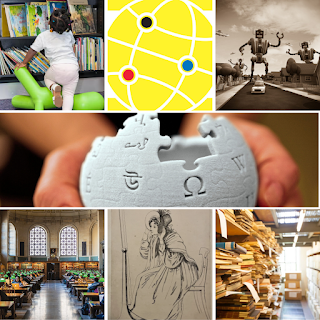Hibernia College has recently released a short course in Digital Literacy as an open educational resource (OER). The course was developed by a small team within Hibernia College’s Digital Learning Department (DLD); Irene O’Dowd (DLD researcher), Ann Byrne (Digital Librarian), and Emberly Davey (library assistant), with support and assistance from the wider DLD team. Originally developed to support the Hibernia College community, the course is now available as an OER on Hibernia College’s institutional repository, IASC.
 |
| Screenshots from the three literacy course lessons and quizzes |
In a world that is becoming increasingly reliant on digital technology, digital literacy skills are especially important and relevant to all. OER creation and dissemination supports the Sustainable Development Goals (SDGs), and this digital literacy OER directly aligns to at least three of these: SDG 4, Quality Education, where digital literacy skills are explicitly addressed, SDG 3, good health and well-being and SDG 8, decent work and economic growth (UN, 2015). This digital literacy course also helps to promote digital citizenship. The Council of Europe (2023) defines digital citizens as “… individuals able to use digital tools to create, consume, communicate and engage positively and responsibly with others." The project team hopes that this course will help to nurture digital citizenship at Hibernia College and beyond.
When developing the course, one of the biggest challenges for the project team was deciding what to cover. Digital literacy is a vast area and the project team needed to consider what would be most useful for students, and relevant to a wider audience. The working group consulted several frameworks including DigComp 2.2. (2022), JISC’s Digital Capabilities Framework (2017) and the CAUL Digital Dexterity Framework (2020). The frameworks displayed significant crossover, each covering five or six key domains. The project team decided on three lessons to compose the Digital literacy course, reflecting three of the frameworks’ domains: Information literacy, digital communication and collaboration, and digital identity and well-being. These were created in Articulate Rise. The three lessons are accompanied by three Moodle quizzes and the course takes approximately one and a half to two hours to complete.
How to access the OER
The Digital Literacy OER is licensed under Creative Commons Attribution-NonCommercial 4.0 International. It is free to reuse and adapt with attribution. It is available for download from Hibernia College’s digital repository, IASC as a zipped folder which includes usage instructions. It can be accessed using the QR code below:
The resource is also available on OER Commons: https://oercommons.org/courses/digital-literacy-oer
References
CAUL (2020)
CAUL Digital dexterity framework. Available at: https://www.caul.edu.au/digital-dexterity-framework (Accessed: 11 March 2024).
Council of
Europe (2023) The concept. Available at: https://www.coe.int/en/web/digital-citizenship-education/the-concept#:~:text=Digital%20citizens%20can%20be%20described,step%20with%20evolutions%20in%20society (Accessed: 11 March 2024).
JISC (2017)
Building digital capabilities: The six elements defined. Available at: https://elnts.coventry.domains/wp-content/uploads/2017/09/ELNCOV_Jisc-Digital-Capabilities-Frameworks.pdf
(Accessed: 11 March 2024).
Vuorikari, R.,
Kluzer, S. and Punie,Y. (2022)
DigComp 2.2. The digital competence framework for citizens. Available
at: https://publications.jrc.ec.europa.eu/repository/handle/JRC128415 (Accessed: 11 March 2024).
United
Nations (UN) (2015) Transforming our world: the 2030 agenda for sustainable
development. Available at: https://sdgs.un.org/sites/default/files/publications/21252030%20Agenda%20for%20Sustainable%20Development%20web.pdf
(Accessed: 11 March
2024).

.png)



.PNG)
.png)


